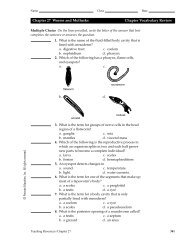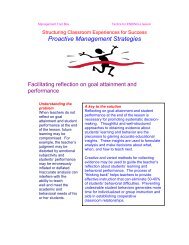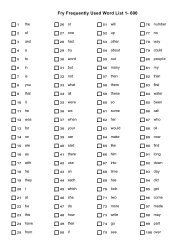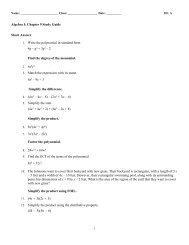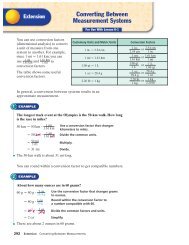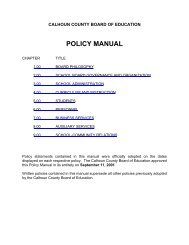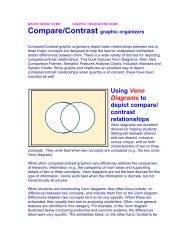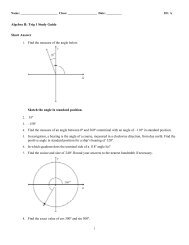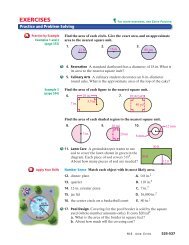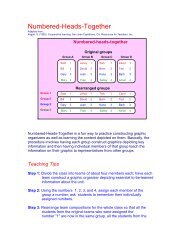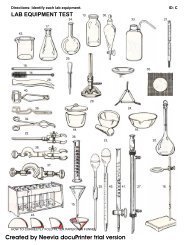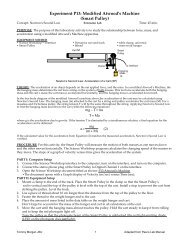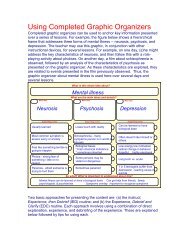We the People Lesson 8.pdf
We the People Lesson 8.pdf
We the People Lesson 8.pdf
Create successful ePaper yourself
Turn your PDF publications into a flip-book with our unique Google optimized e-Paper software.
Why did <strong>the</strong> colonies want to free<br />
<strong>the</strong>mselves from Great Britain?<br />
<strong>Lesson</strong> 8 Objectives<br />
You will identify <strong>the</strong> situations in which <strong>the</strong><br />
colonists claimed <strong>the</strong> British government<br />
violated some of <strong>the</strong> basic principles of<br />
constitutional government and analyze <strong>the</strong><br />
reason to justify a declaration of<br />
independence from Great Britain.<br />
<strong>Lesson</strong> 8: Terms of Importance<br />
1. ministries – departments of government created by<br />
Parliament and <strong>the</strong> king to help develop new policies<br />
and enforce <strong>the</strong> laws Parliament had passed.<br />
2. corrupt government – when leaders work with<br />
bankers and businessmen for <strong>the</strong>ir own self interests<br />
at <strong>the</strong> cost of <strong>the</strong> common welfare.<br />
3. 1 st Continental Congress – 12 of 13 colonies sent<br />
delegates to Philadelphia in 1774 to decide on a<br />
response to <strong>the</strong> actions of Britain. They decision was<br />
to ban trade with Britain to get it to change its<br />
policies toward <strong>the</strong> colonies.<br />
1
<strong>Lesson</strong> 8: Terms of Importance<br />
4. abuse of power – when <strong>the</strong> balance of<br />
power is upset in a government and <strong>the</strong><br />
common welfare is threatened by those<br />
in charge.<br />
5. Minutemen – militias formed by local<br />
communities from civilians that had great<br />
pride in who <strong>the</strong>y were and how quick<br />
<strong>the</strong>y could form for an anticipated British<br />
attack.<br />
Minutemen<br />
2
Britain becomes a World Power<br />
• England had <strong>the</strong> strongest army and navy in <strong>the</strong><br />
world and could exert it’s power worldwide.<br />
• Britain’s empire needed a larger government to<br />
deal with it’s world empire which included<br />
America.<br />
• To do this, <strong>the</strong> king and Parliament created<br />
ministries, headed by appointed ministers, to<br />
carry out <strong>the</strong> laws in <strong>the</strong>se colonies around <strong>the</strong><br />
world.<br />
Charges of Corruption<br />
• By <strong>the</strong> early 1720s, some in Britain believed <strong>the</strong> executive<br />
branch was too strong.<br />
• They claimed that <strong>the</strong> king and his ministers<br />
– ignored <strong>the</strong> limitations placed on <strong>the</strong>m by <strong>the</strong> English<br />
Constitution<br />
– violated <strong>the</strong> rights of people<br />
– favored <strong>the</strong>ir own interests at <strong>the</strong> cost of common welfare<br />
• It was common for <strong>the</strong> king to bribe members of Parliament.<br />
• It was well known that <strong>the</strong> king and his ministers were working<br />
closely with bankers and businesses to gain wealth and power<br />
at <strong>the</strong> expense of all o<strong>the</strong>rs.<br />
• The king got taxes raised to keep a huge navy and army.<br />
• The American colonists were aware of this but ignored it<br />
because Britain had basically ignored <strong>the</strong>m since AD1607.<br />
3
British Government Tighten Control Over <strong>the</strong> Colonies<br />
• America had been obeying only <strong>the</strong> laws <strong>the</strong>y agreed<br />
with.<br />
• One <strong>the</strong>y did not obey was <strong>the</strong> Navigation Acts which<br />
forced America to trade only with Britain.<br />
• Cost British money to protect Americans on <strong>the</strong><br />
frontier<br />
• The French and Indian War<br />
– Started in America and spread to Europe<br />
– Fought from 1754-1763 between Britain and France<br />
– Cost Britain money to protect American colonies<br />
– Britain raised taxes and restrictions on America to<br />
help pay for war<br />
4
The Colonists Begin to Resist<br />
• New laws and restrictions meant colonists<br />
would lose money.<br />
• Accustomed to Salutary Neglect<br />
• Colonists did not have <strong>the</strong> right to vote for<br />
Parliament. They felt like that Parliament had<br />
no right to tax <strong>the</strong>m.<br />
• NO TAXATION WITHOUT<br />
REPRESENTATION!<br />
The Colonists Begin to Resist<br />
ACTS AND EVENTS THAT CONVINCED AMERICANS THAT<br />
THE BRITISH WERE VIOLATING THEIR RIGHTS<br />
1. Quartering Act – required colonists to allow<br />
British soldiers to live in <strong>the</strong>ir homes.<br />
2. The Boston Massacre – a mob threatened to<br />
attack a sentry at <strong>the</strong> Customs House in<br />
Boston, <strong>the</strong> mob was fired on by <strong>the</strong> British<br />
troops, Crispus Attucks first to be killed (7<br />
total), British troops charged with murder but<br />
found innocent – made colonists more<br />
resistant to British rule.<br />
5
The Colonists Begin to Resist<br />
3. Tea Act – lowered taxes on tea but reasserted<br />
Parliament’s power to tax <strong>the</strong> colonies - result<br />
was The Boston Tea Party and <strong>the</strong> boycott of<br />
British goods.<br />
4. The Intolerable Acts – Britain’s response to <strong>the</strong><br />
Tea Party. It shut down <strong>the</strong> port of Boston,<br />
limited town meetings, gave more power to <strong>the</strong><br />
royal governor, and planned for a massive<br />
British occupation of Boston.<br />
6
The Colonists Organize<br />
• Fall of 1774 – 12 of 13 colonies sent delegates<br />
to Philadelphia for <strong>the</strong> 1 st Continental Congress.<br />
• Delegates agreed to stop trade with Britain to<br />
stop <strong>the</strong> abuse of power<br />
• Many colonies, especially in New England,<br />
were preparing for war – <strong>the</strong>y had organized<br />
Minutemen Militias in anticipation of an attack.<br />
• They believed it was <strong>the</strong> right of <strong>the</strong> people to<br />
overthrow a government that no longer<br />
protected <strong>the</strong>ir rights.<br />
The Revolution Begins<br />
• On April 19, 1775, British troops tried to march<br />
to Concord, MA.<br />
• They heard that Minutemen were hiding arms<br />
and ammunition <strong>the</strong>re.<br />
• Paul Revere and William Dawes rode ahead of<br />
<strong>the</strong> redcoats warning people that <strong>the</strong> British<br />
were coming.<br />
• On that day, at Lexington and Concord, <strong>the</strong><br />
Minutemen and Britain met on <strong>the</strong> battle field<br />
and <strong>the</strong> “shot that was heard around <strong>the</strong> world”<br />
was fired.<br />
7
Colonies Organize and Unite<br />
• June 1775, delegates met in Philadelphia for 2 nd<br />
Continental Congress (first government to<br />
unify <strong>the</strong> colonies as a nation)<br />
– Appointed Payton Randolph as first president<br />
Continental Congress Presidents - 1774 to 1789.mht<br />
– George Washington is chosen as commander-in-chief<br />
of <strong>the</strong> Continental Army<br />
– A year later, <strong>the</strong>y chose a committee to draft a<br />
Declaration of Independence that would explain why<br />
America wanted to be free.<br />
<strong>Lesson</strong> 8 Review<br />
1. Critics of <strong>the</strong> British government believed it<br />
was becoming corrupt. What evidence did <strong>the</strong>y<br />
have for <strong>the</strong>ir opinion?<br />
2. By <strong>the</strong> 1760s, American colonists began to<br />
resist certain actions of <strong>the</strong> British government.<br />
What were <strong>the</strong>se actions and why did many<br />
Americans resist <strong>the</strong>m?<br />
3. The British government, for <strong>the</strong> most part,<br />
believed that its policies in <strong>the</strong> colonies were<br />
fair and just. Develop arguments in support of<br />
<strong>the</strong> British government’s point of view.<br />
8
<strong>Lesson</strong> 8 Review<br />
4. List 2 specific events that led to <strong>the</strong><br />
American decision to revolt against <strong>the</strong><br />
British government. For each you select,<br />
identify <strong>the</strong> basic idea about government it<br />
violated. Then, develop an argument<br />
based upon <strong>the</strong> ideas and events to justify<br />
<strong>the</strong> American revolution against <strong>the</strong> British<br />
government.<br />
<strong>Lesson</strong> 8 Review<br />
5. Women took an active role in <strong>the</strong> revolutionary<br />
struggle, forming anti-tea leagues and nonimportation<br />
groups to see that colonists did not<br />
buy British goods during <strong>the</strong> boycott. What does<br />
<strong>the</strong> following quotation tell you about women’s<br />
views on <strong>the</strong>ir role in colonial politics?<br />
“Let Daughters of Liberty, nobly arise, And tho’s<br />
we’ve no Voice, but a negative here, The use of<br />
<strong>the</strong> Taxables, let us forbear.”<br />
9



